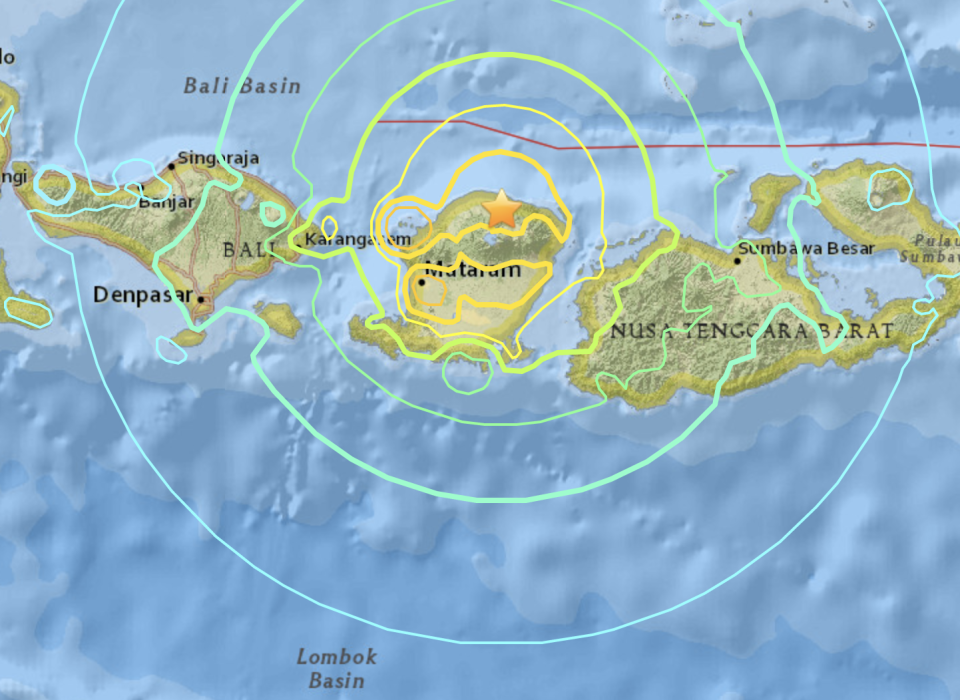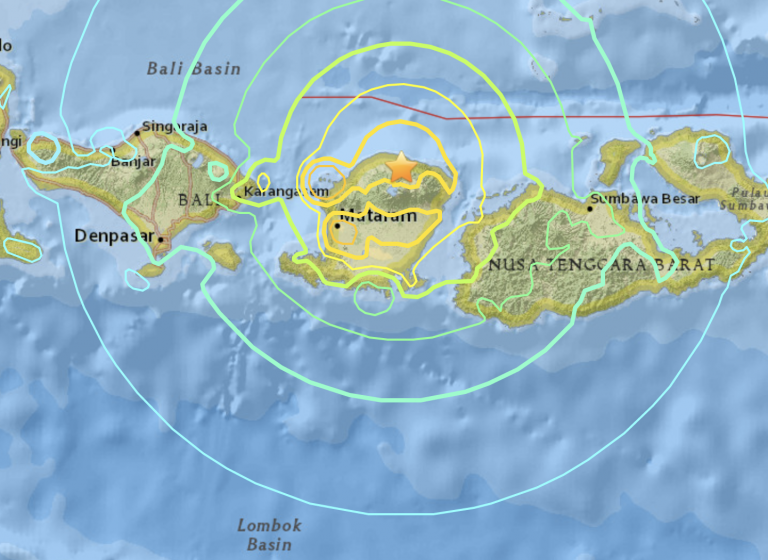Indonesia earthquakes: Is it safe to travel and how will holidays be affected?
Two earthquakes in quick succession in eastern Indonesia have cost hundreds of lives on the island of Lombok and on neighbouring islands. Bali has also sustained damage.
In the first, on 29 July, 16 people were killed and hundreds of houses damaged. The second, on 5 August, was more deadly. More than 250 people are known to have died after a magnitude 6.9 earthquake struck the north of Lombok.
Many prospective visitors have contacted The Independent to ask for advice on the situation in the region, and their options if they decide not to travel. These are the key questions.
Q How seismically active is this part of Indonesia?
Very active. The country is defined by string of volatile volcanoes stretching for thousands of miles, and comprising an arc on the so-called “Ring of Fire” around the Pacific.
The Foreign Office has long warned: “Volcanic eruptions and earthquakes occur regularly, which can present a potential threat of tsunamis.” It notes: “The capacity of the Indonesian emergency and rescue services to deal with large natural disasters is limited.”
The main tourism hub for British visitors is the island of Bali, which is adjacent to Lombok and which has an active volcano in the shape of Mount Agung. Over the past year it has undergone some fairly small-scale eruptions, which led to periodic closures of Bali and Lombok airports. There is still an exclusion zone of 4km from the crater, which is showing signs of activity.
The earthquake in Lombok damaged buildings in Denpasar and Kuta on the island of Bali, and caused some superficial damage at the airport. Bali and Lombok airports are open, with flights operating normally.
Q My daughter is on a gap year and is travelling in the region. What can I tell her to help her keep safe?
The Foreign Office is a good source. It advises against all but essential travel to areas of Lombok north of the main east-west route from Pamenang, which passes north of the capital Mataram and across to Lombok town. This area includes the Gili Islands and the Mount Rinjani National Park.
British travellers who visit the area against the official advice risk their travel insurance becoming invalid. The same applies to people who are unwilling to evacuate the islands.
If your daughter needs consular assistance, she can call the British Consulate in Bali on +62 21 2356 5200. Conversely, if you’re in the UK and concerned about your daughter’s whereabouts and believe she may be in Lombok or on the Gili Islands, call the Foreign Office on 020 7008 1500.
Q We have spent £6,000 on our last big holiday for two or three years, with our young children, and are booked to Bali on Sunday. Given the earthquake action over the last days and weeks, what do you think we should do?
In your position, I would certainly plan to go ahead as normal – and happily take my family. The civil defence preparedness in Bali is reasonably good, and I would be confident in the authorities taking appropriate action if there is a threat. But given the risk of aftershocks in the coming days and weeks, I urge anyone heading for an earthquake-prone part of the world to read up on the risks and how to minimise them.
The research I have done indicates these are good steps to take:
1. Stay where you are until the shaking stops.
2. Drop down onto your hands and knees so the earthquake doesn’t knock you down.
3. Cover your head and neck with your arms to protect yourself from falling debris.
4. If you are in danger from falling objects, and you can move safely, crawl for additional cover under a sturdy desk or table.
5. If there is low furniture or an interior wall or corner nearby, and the path is clear, these may also provide some additional cover.
6. Stay away from glass, windows, outside doors and walls, and anything that could fall, such as light fixtures or furniture.
7. Hold on to any sturdy covering so you can move with it until the shaking stops.
8. Do not try to run.
9. If you are outside, move away from buildings, trees, lamp posts and power lines – anything that could harm you if it falls (including vases, windows, tiles, etc on buildings). Be aware that landslides can follow earthquakes, and that ruptured pipes can leak gas or water.
Q My husband and I are traveling to Sanur in Bali in a week’s time. Is it safe to go?
Probably. I realise that is not a particularly helpful response, but it is genuinely the best I can offer. Any visitor to Bali at any time is accepting a small risk that seismic activity will affect their trip. Evidently the earth beneath this part of Indonesia has been more restless than usual in the past year. You can reduce the risks by checking potential exit routes from your accommodation.
The Foreign Office rather passes the buck for responsibility about deciding whether or not to travel, saying: “Keep your travel plans under close review and seek the advice of your transport and accommodation providers before travelling, and ensure that you have contingency plans and travel insurance in place.”
Q Will my travel insurance allow me to cancel or come home early?
A spokesperson for the Association of British Insurers told The Independent: “Anyone booked to go to areas affected should speak to their tour operator, air carrier or travel agent for advice and assistance.
“If people make alternative travel plans, then they can usually transfer their travel insurance to cover the new arrangements.
“Anyone already in the area and who wants to return home, should in the first instance speak to their tour operator or air carrier.
“Check your travel insurance policy, because some (but not all) may cover non-recoverable cancellation costs where the government advises against travel.”
Q My daughter and son-in-law are due to fly out to Bali, Lombok and the Gili Islands on their honeymoon. Is there anything that can be done to legally cancel this without them losing the entire cost?
In these circumstances, holiday companies are generally happy to discuss alternatives. For example, Kuoni says: “We’re doing everything we can to support customers with alternative travel plans. For departures up until the end of August we are offering free cancellations or amendments and will continue to monitor the situation closely.
"Customers travelling to Gili and Lombok to 31 August are being offered cancellation or amendments free of charge. If they do not want a ‘Bali only’ holiday we will aim to find a suitable alternative destination.
"Bookings from September onwards will be reviewed early next week unless further information is forthcoming in the meantime."
Some UK travel firms may insist that normal terms and conditions apply, with the only exception being the Foreign Office warning about northern Lombok and the Gili Islands. If this area comprises a significant part of their trip, then it should be possible to argue that the holiday cannot be delivered as promised. In any event, it may be possible to switch to alternative Indonesian destinations.
Q We are organising our own DIY trip to Indonesia. We were due to visit northern Lombok and the Gili Islands. Are we best to cancel our holiday completely? I’m really worried about the aftermath.
The infrastructure in Lombok and the Gili Islands has been damaged, and even when the Foreign Office advice is eased it may not be a great time to visit the area.
Some airlines are being flexible. For example, Singapore Airlines says passengers with tickets to Lombok up to 10 August 2018 can request a refund of their tickets. But the general rule is that: if you have booked a flight to Bali, and the airline can safely get you there, then the fact that you no longer want to go is not grounds for cancellation without penalty.
The same goes for any properties you have booked on a non-refundable basis: if they are open for business, and can provide what you booked, a “disinclination to travel” is not their problem. The best you can hope for is likely to be the opportunity to postpone without penalty. But whenever you go, Bali, Lombok and the Gili Islands will still be part of the Ring of Fire.


